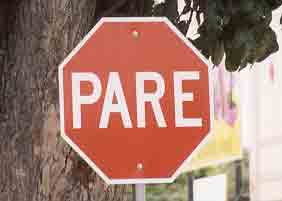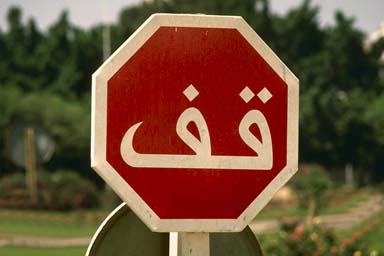Talk:Quebec
|
|
See also Talk:Quebec/archive 1
It looks like if Inuit is in the list, it must be a list of First Peoples, not First Nations? or is the article on First Nations wrong? -- Someone else 07:26 Mar 12, 2003 (UTC)
- I have no problem with First Peoples. My objection was to making that a link to Native Americans. ☮ Eclecticology
For the present, I've removed the link to a "separatist statement" that was added. I don't think it's especially valuable just to link to some individual separatist's statement. Even an official link would be best served under, say, Parti Québécois for example. - Montréalais
| Contents |
National Assembly 1948
Talking about the National Assembly in 1948 is an anachronism: Quebec still had a Legislative Council and Legislative Assembly at that time. Not sure how to revise the page, though. Which house made the unanimous vote? Both? Indefatigable 22:44, 29 Aug 2003 (UTC)
I like the Arrêt sign under "symbols" =D I have it on decent authority (a European who's been a lot of places) that PQ and NB are about the only places where a stop doesn't say Stop. Even in Russia - I've seen photos - they say "CTO(pi)".
- This is an old comment, but...
- here's a Spanish stop sign from Puerto Rico (PARE):

- here's an Arabic stop sign from Morocco (قف):

Excessive maps
Resolved
Why are there so many different maps of Quebec on here? Surely one can be removed. It looks strange having so many different versions.
- Agreed, too many are just confusing. There are 2 that are completely identical in content and scope, except in colour. So I moved that one away. And I also moved a historical map to, suitably, History of Quebec. --Menchi 03:58, 17 Nov 2003 (UTC)
Voltaire
Voltaire did not say that Canada was quelques arpents de neige, as he's popularly quoted to have said. He said that Acadia was quelques arpents de neige near Canada. Bearcat 02:12, 8 Mar 2004 (UTC)
- The exact Voltaire quote I've seen is: La Nouvelle-France: quelques arpents de neige qui ne valent pas les os d'un grenadier français. Not Acadia, but Nouvelle-France. So I'm restoring it. P.T. Aufrette 13:59, 8 Mar 2004 (UTC)
- The correct quote is Vous savez que ces deux nations sont en guerre pour quelques arpents de neige vers le Canada, et qu'elles dépensent pour cette belle guerre beaucoup plus que tout le Canada ne vaut. [1] (http://micat.waika9.com/) [2] (http://www.voltaire-integral.com/VOLTAIRE/candide2.html) Note also that if you google on it, the "vers le Canada" version exists in a number of actual footnoted Voltaire reference pages, while the "Nouvelle France" version can only be found as an isolated, anecdotal quote. This is a case where a variety of versions are remembered (you can also find pages where it's claimed that he wrote quelques arpents de neige, habités par des barbares, des ours et des castors), but none of them are what was actually said. Bearcat 16:05, 8 Mar 2004 (UTC)
- In French, vers would mean "towards", but in the sentence of Voltaire, it means more "around" or "nearby" or "in the surroundings of". This could mean Acadia I guess, but I find it far fetch. Voltaire never named Acadia. I think he probably was referring to the disputed borders between New France and the British colonies (which indeed is Acadia). Snow was pretty much a feature of le Canada in the imaginary of the French at the time. It is unfortunately still the case today. According to them, we are all riding skidoos, getting stuck to each other when we kiss (because of the cold), we all know how to make igloos (!?!) and we are all related to an Indian somehow. :-) Mathieugp 18:19, 8 Mar 2004 (UTC)
- I created an article on the few acres of snow quotation this morning; I've added the link to the "See Also:" section here. Bearcat 22:42, 8 Mar 2004 (UTC)
NPOV s. bill 101
I don't feel comfortable starting a counter-edit war being new here, but I sort of question the anonymous removal of among Anglophones. It doesn't seem to me like a significant amount of Francophones are against the Charter. -- Valmi Dufour 15:36, 24 Jun 2004 (UTC)
I agree with Valmi Dufour.
Furthermore, this phrase is not correct: "Often known as "Bill 101", it defined French as the only official language of Quebec". French is the official language of Quebec since the (non-separatist) liberal prime minister Robert Bourassa voted Bill 22 in 1974 (July 31rd) (reference) (http://www.vigile.net/997-2/stats.html). The french version of the page has the same error.
It should be mention also that all main political parties in Quebec since the fifties were nationalist except the Equality Party, a marginal Montreal west-islander anglophone party formed in 1989 (I think they're dead now, they didn't win any seats at the national assembly since 1994). The thing is not all of them were promoting independence. There should be a link to the History of the Quebec sovereignist movement (http://en.wikipedia.org/wiki/History_of_the_Quebec_sovereignist_movement) page.
Quebec Act
It should be mentioned that the Quebec Act of 1774 contributed to unrest in the Thirteen Colonies prior to the War of American Independence.
some thoughts
The article mentions that bill 101 is "to this day still controversial and widely misunderstood inside and outside Quebec". I would say that inside Quebec today, the bill would only still be controversial to anglophone and allophone communities, at most. I feel the initial fears have dissipated since the bill's adoption.
The article mentions "widespread complaints of the destruction of NO ballets "(sic). There was widespread complaints from both sides about the other side's illegal dealing in this referendum. I think mentionning only one side's is very partial and reflects a point of view, which I believe should be avoided in "encyclopedia format".
What do you think ? should these be editted ?
- 1. Bill 101 is still misunderstood inside Quebec. Obviously, people who only get their daily information from the English language press are more in the dark then the others, but nevertheless a lot of people do not know the contents of the law and the regulations passed under it.
- 2. Yes, you are right. This is not NPOV at all. It was added recently by some anonymous. It should be removed in my opinion.
-- Mathieugp 16:21, 23 Sep 2004 (UTC)
Why not Québec?
I understand this is the English article on Québec, but in Canadian government, the province is referred to as Québec (with the accent). Perhaps the article could be moved from Quebec to Québec.
- That is not correct. The federal government's English style guide (The Canadian Style) specifies that the province is "Quebec" in English, "Québec" in French. This matches the centuries-old common practice of English-speaking Quebecers, and the no-accent style is the most common spelling of professional editors everywhere. Indefatigable 00:48, 9 May 2005 (UTC)
Pierre Trudeau, the RCMP, and the FLQ?
I have never heard about this before I read this page. I believe I have a fairly wide ranging knowledge of the era and the incident and I would just like a source to the inquiry that says that Trudeau pushed the RCMP to inflitrate the FLQ to push them to violent actions. Much of the evidence of the time points to the idea that the RCMP had very little in the way of background on the FLQ and it was part of what led to the massive confusion on the part of the federal government at the time.
I could not find it in English (of course), but here it is in French:
http://www.vigile.net/00-10/octobre-grandchamp.html (last article at the bottom)
You can use Google or Babelfish to get a rought translation. I will translate it myself this weekend.
The name of the inquiry is the McDonald Commission. They also mention a Keable Commission in 1977.
In English, I only found this one good article:
http://www.vigile.net/01-1/flq-citizen.html
-- Mathieugp 12:12, 16 Jun 2005 (UTC)
I found a radiocast on the subject of the MacDonald commission in the online archives of Radio-Canada:
http://archives.radio-canada.ca/IDCC-0-9-1500-10144/guerres_conflits/espionnage_canada/
-- Mathieugp 15:11, 16 Jun 2005 (UTC)
Historical Corrections Sabotaged
I've put back my modifications concerning the 1837 "rebellion" of the french canadians.
I am an historian who devoted his whole life to this brief moment of Québec history and I find it offuscating and frustrating to see a complete denial of the real story.
Most of the sources can be found in Normand Lester's Le Livre noir du Canada Anglais and are factual proofs.
Please respect the people that horribly died in this dark period...
"Je me souviens"...
- Lester's book is hardly a reputable source; it has been widely criticized by both francophone and anglophone historians -- at least those who take time to comment on it. HistoryBA 23:12, 20 Jun 2005 (UTC)
- By the way, since you raise your own qualifications to justify your position, would you mind expanding on them? What do you mean when you call yourself a "historian"? HistoryBA 23:14, 20 Jun 2005 (UTC)
Le livre noir du Canada anglais
This book has valid sources, and most of what is written in it is valid too. However, it is a pamphlet. Its avowed objective is to demonstrate the hypocrisy of these Anglophone columnists who desperately try to stain the reputation of Quebec nationalists while remaining silent on the wrong doings of Canadian nationalists. That being said, the history of the "rebellions" is complex enough that it can't seriously be summed up in a short biased paragraph like the one added by the anonymous user.
-- Mathieugp 03:21, 21 Jun 2005 (UTC)
- I'm not questioning its sources, but rather using it as a source. It is simply not a reliable NPOV source. We should be very suspicious of using any statements from the book as fact, unless they can be properly verified or corroborated by a reputable historian. HistoryBA 03:32, 21 Jun 2005 (UTC)
- I don't think we should be very suspicious of it only because it has a point of view. At least, Normand Lester had the honesty of making his objective with his book quite clear unlike so many other people before him. We should simply be aware that it is a pamphlet and not the work of a historian, but a journalist: big difference. However, on the whole, the information in the book is well-referenced and, as such, his own references are worth digging into. The dumb sentence written by the anonymous user is of course nowhere to be found in the book! You will however find all kinds of interesting and factual details on the episode of the burning of the Parliament of Canada in Montreal ( and the fanatics who later repeatedly tried to kill Lafontaine and the other politians who supported the Rebellion Losses Bill), the antisemitism of the elite of Canada before and after the second world war, the KKK in the West and all kinds of details I didn't even know about.
- Also, relying on a "reputable" historian is something you want to do only if you intend to commit the logicial fallacy of appealing to the authority. I would advice we all bother to take the time to find out what's true and what isn't on our own instead. -- Mathieugp 14:12, 21 Jun 2005 (UTC)
- The problem is that the anonymous editor is not citing the sources used by Lester, but citing Lester himself as an authority, which he is not. I agree that we need to verify facts ourselves, but we often need to rely on published sources, such as those written by established historians. After all, Wikipedia has a policy against publishing original research. HistoryBA 23:15, 21 Jun 2005 (UTC)
